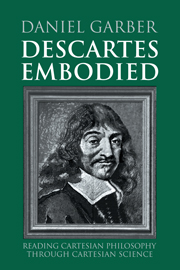Book contents
- Frontmatter
- Contents
- Acknowledgments
- Abbreviations, Citations, and Translations
- Introduction
- Part I Historiographical Preliminaries
- Part II Method, Order, and Certainty
- 2 Descartes and Method in 1637
- 3 A Point of Order: Analysis, Synthesis, and Descartes' Principles (with Lesley Cohen)
- 4 J.-B. Morin and the Second Objections
- 5 Descartes and Experiment in the Discourse and Essays
- 6 Descartes on Knowledge and Certainty: From the Discours to the Principia
- Part III Mind, Body, and the Laws of Nature
- Part IV Larger Visions
- Sources
- Index
6 - Descartes on Knowledge and Certainty: From the Discours to the Principia
Published online by Cambridge University Press: 10 November 2009
- Frontmatter
- Contents
- Acknowledgments
- Abbreviations, Citations, and Translations
- Introduction
- Part I Historiographical Preliminaries
- Part II Method, Order, and Certainty
- 2 Descartes and Method in 1637
- 3 A Point of Order: Analysis, Synthesis, and Descartes' Principles (with Lesley Cohen)
- 4 J.-B. Morin and the Second Objections
- 5 Descartes and Experiment in the Discourse and Essays
- 6 Descartes on Knowledge and Certainty: From the Discours to the Principia
- Part III Mind, Body, and the Laws of Nature
- Part IV Larger Visions
- Sources
- Index
Summary
Descartes is usually classed among the rationalists, those philosophers who privilege reason over experience. And indeed he belongs there. On the other hand, though, Descartes was also very interested in experiment. The Dioptrique and Météores make a number of references to Descartes' experiments; the Discours discusses the importance of experiments at some length. In the Principia, written starting in early 1641 and published in 1644, Descartes refers to a number of experimental results to support his views, most visibly in the discussion of the magnet. And at the end of that book, he goes so far as to suggest that his vision of the world is ultimately supported by the fact that it is capable of explaining observed phenomena, and nothing more. Where is the real Descartes? Is he mathematician or experimenter? rationalist or empiricist?
This is the larger question that I would like to explore in this essay. But I would like to address it in a rather particular and somewhat special way. Generally, discussions of Descartes' views about knowledge and experience concentrate on texts like the Meditations, and on issues concerned with knowledge of the kinds of grand questions that he takes up there, the knowledge of self, body, the distinction between mind and body, God, and so on. What I want to focus on is something much more mundane. The water we drink every day has a nature, from which follow certain well-known properties; water is wet and liquid at room temperature, solid when very cold, quenches thirst, admits light, but causes certain illusions, like the famous bent-stick illusion. All of this is somehow connected with its structure.
- Type
- Chapter
- Information
- Descartes EmbodiedReading Cartesian Philosophy through Cartesian Science, pp. 111 - 130Publisher: Cambridge University PressPrint publication year: 2000
- 2
- Cited by



